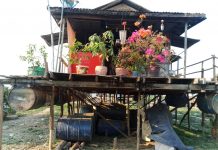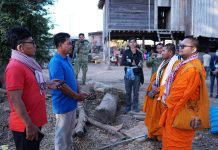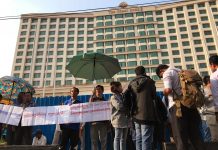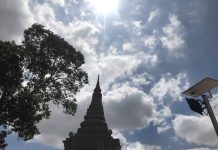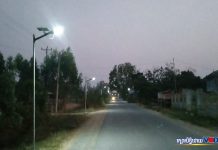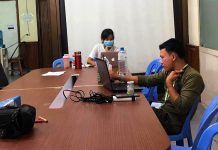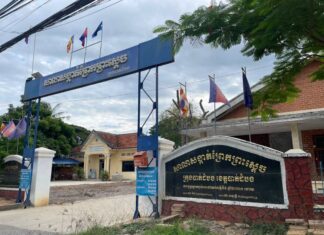‘Art in the Park’ Transforms Plastic Waste Into a Dragon, Drooping Branches Into Butterfly...
Nine artists will be featured in an art exhibition, Art in the Park, at the French Embassy on March 7 to encourage people’s love of nature.
ម្ចាស់ដីត្អូញត្អែរ ពីការខកខានទទួលថ្លៃជួល ពីគ្រួសារផ្ទះបណ្ដែតទឹក
ម្ចាស់ដីដែលបានជួលដីចំការទៅឱ្យគ្រួសារវៀតណាម ខកខានទទួលប្រាក់ថ្លៃជួលដីជាងមួយឆ្នាំមកហើយ បន្ទាប់ពីអាជ្ញាធរខេត្ដកំពង់ឆ្នាំងបានធ្វើការបំលាស់ទីពួកគេពីទឹកឡើងមកលើគោកកាលពីឆ្នាំ២០១៨កន្លង។
ការចុះយកព័ត៌មានតាមខេត្តលើកដំបូង
កាលឡើងចុះខេត្តញឹកញាប់ជារឿងធម្មតាទេសម្រាប់ខ្ញុំ។ រឿងដែលខ្ញុំចង់បង្ហាញនោះគឺសប្ដាហ៍នេះខ្ញុំបានចុះទៅខេត្តស្ទឹងត្រែង ហើយមានអាជ្ញាធរ មកសួរនាំ ថតរូប និងសុំបញ្ជីវត្តមានជាដើម។
សហគមន៍ព្រៃឡង់ និងអង្គការសង្គមស៊ីវិលខកចិត្តអាជ្ញាធររារាំងប្រារព្ធពិធីបំបួសដើមឈើ
បណ្ដាញសហគមន៍ព្រៃឡង់ខេត្តស្ទឹងត្រែង និងសកម្មជនព្រៃឈើជាង១០០នាក់ ធ្វើដំណើរតាមគោយន្ត និងមធ្យោបាយផ្សេងៗ មកប្រមូលផ្តុំក្នុងភូមិមួយ ក្នុងស្រុកថាឡាបរីវាត់ ខេត្តស្ទឹងត្រែង នៅល្ងាចថ្ងៃទី២១ ខែកុម្ភៈ ឆ្នាំ២០២០ ដើមត្រៀមខ្លួនចូលរួមពិធីបំបួសដើមឈើ។
ពលរដ្ឋមានជម្លោះដីធ្លីនៅកោះកុង នឹងបន្តទាមទារដំណោះស្រាយ ក្រោយក្រសួងដែនដីបដិសេធ
សហគមន៍ចំនួនបី ដែលមានជម្លោះដីធ្លី ក្នុងខេត្តកោះកុង ប្រកាសបន្តទាមទាររកដំណោះស្រាយ ក្រោយពីក្រសួងរៀបចំដែនដី ចេញសេចក្តីប្រកាស ពុំទទួលដោះស្រាយរឿងបញ្ហាដីធ្លី ជូនពួកគេ។
កម្ពុជាចាប់ផ្តើមយុទ្ធនាការ «គ្រួសាររឹងមាំ» ដើម្បីបញ្ចប់ហិង្សាលើកុមារ និងការបំបែក ចេញពីគ្រួសារ
អង្គការយូនីសេហ្វ(Unicef) សហការជាមួយ ក្រសួងសង្គមកិច្ច ធ្វើយុទ្ធនាការ «គ្រួសាររឹងមាំ» ដើម្បីបញ្ចប់អំពើហិង្សាលើកុមារ និងការបំបែកកុមារចេញពីគ្រួសារ ដោយមិនចាំបាច់នៅកម្ពុជា។
អតីតបុគ្គលិក សណ្ឋាគារ The Great Duke មិនទាន់សម្រេចយកសំណង
អតីតបុគ្គលិក សណ្ឋាគារ The Great Duke បាននឹងកំពុងពិចារណាទទួលយក សំណងបីក្នុងបួនចំណុចដែលបានសម្រេចផ្តល់ជូនដោយក្រុមប្រឹក្សាអាជ្ញាកណ្តាល។
GMAC ស្នើសហភាពអឺរ៉ុប ពិចារណាឡើងវិញ នូវការសម្រេចព្យួរផ្នែកខ្លះនៃ EBA
សមាគមរោងចក្រកាត់ដេរនៅកម្ពុជា(GMAC) ស្នើគណៈកម្មការ និងសមាជិកសភាអឺរ៉ុប ពិចារណាឡើងវិញចំពោះសេចក្ដីសម្រេចការព្យួរដោយផ្នែកនៃប្រពន្ធ័អនុគ្រោះពន្ធលើគ្រប់មុខទំនិញលើកលែងតែគ្រឿងសព្វាវុធ(EBA)សម្រាប់កម្ពុជា ដែលបានអនុវត្តជិត២០ឆ្នាំមកហើយ។
ក្រសួងកសិកម្ម រឹតបន្តឹង ការនាំចូល បក្សី ពីវៀតណាម ក្រោយពី មានការ ផ្ទុះជំងឺ ផ្តា សាយបក្សី
ក្រសួងកសិកម្ម ចាប់ផ្តើមរឹតបន្តឹង ក្នុងការនាំចូលបក្សី ដើម្បីទប់ស្តាត់ ការឆ្លង ជំងឺ ផ្តាសាយ បក្សី បន្ទាប់ពីមានការ ផ្ទុះជំងឺនេះ ជាថ្មី នៅប្រទេសវៀតណាម។
My Eternal Valentine
I still remember the time I laid down by your side and listened to your childhood, the toothless smile you made when we joked around, how charming you were as a child, how satisfied you were after I shaved your hair.
Practice What You Preach
I’ve heard people gossip about someone doing things in an improper way, but then those people often don’t see what they are doing themselves.
I Felt Like a Real Journalist Going to the Field With a British Mentor
If you study at school, you might just sit inside the class or do assignments in the library or coffee shop somewhere. But exploring a new environment is more important.
ព្រះអាទិត្យ និង ព្រះចន្ទ
«ជីវិតគឺជាការតស៊ូ» ប៉ុន្តែការតស៊ូខ្លះហាក់បីដូចជា គ្មានទីបញ្ចប់ ស្រពិចស្រពិល គ្មានកោះគ្មានត្រើយ និងនឿយហត់ ឥតស្រាកស្រាន ទោះបីជាជីវិតនោះជិតអស់ទៅវិញទៅហើយក៏ដោយ។
អាជ្ញាធរនិងពលរដ្ឋនៅឃុំពន្លៃថាអំពូលសូឡាបំភ្លឺបំពាក់តាមផ្លូវជួយបង្កើនសុវត្ថិភាពភូមិឃុំ
អ្នកភូមិ និងអាជ្ញាធរក្នុងឃុំពន្លៃ ខេត្តតាកែវ លើកឡើងស្រដៀងគ្នាថាការបំពាក់អំពូលពន្លឺព្រះអាទិត្យ ឬហៅថាអំពូលសូឡា មិនត្រឹមតែជួយបំភ្លឺដល់អ្នកធ្វើដំណើរក្នុងពេលរាត្រីប៉ុណ្ណោះទេ ប៉ុន្តែវាថែមទាំងជួយទប់ស្កាត់បញ្ហា អសន្តិសុខក្នុងមូលដ្ឋានទៀតផង។
អ្នកកាសែត ជាអ្នកតស៊ូប្តូរសុត្ថិភាព និងក្តីសុខផ្ទាល់ខ្លួនកកាយរឿងពិតដើម្បីឲ្យមនុស្សបានយល់បានដឹង
អ្នកកាសែតមិនខុសពីអ្នកកាត់ក្តីទេ គឺត្រូវនៅលើប៉ូលត្រឹមត្រូវ រឺប៉ូលមិនលុះក្នុងអគតិទាំង៤ មាន៖
សប្តាហ៍នេះខ្ញុំបានរៀនច្បាប់ស្តីពីរបបសារព័ត៌មាន
ខ្ញុំឈ្មោះ យី សារ៉ាត់ ជាសិក្ខាកាមCCIMជុំនាន់ទី២។



